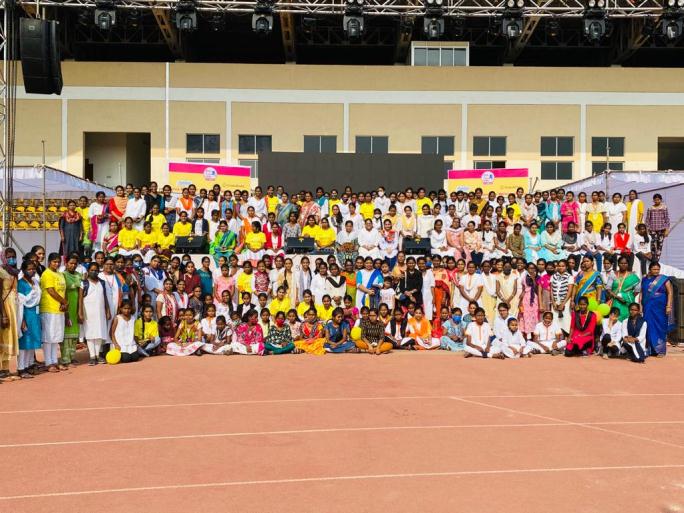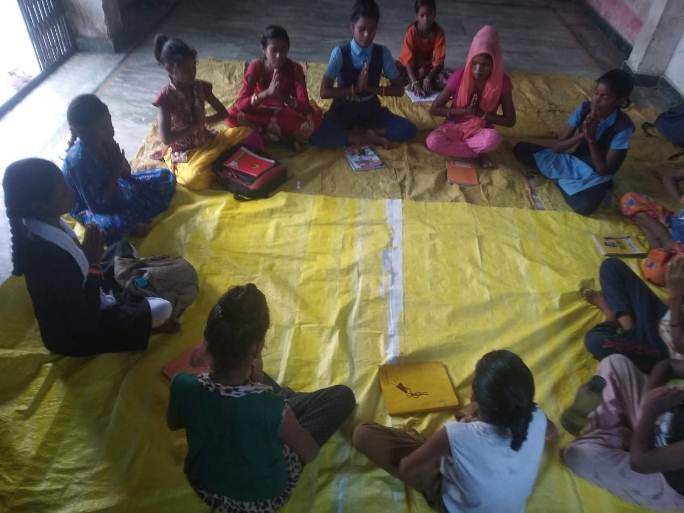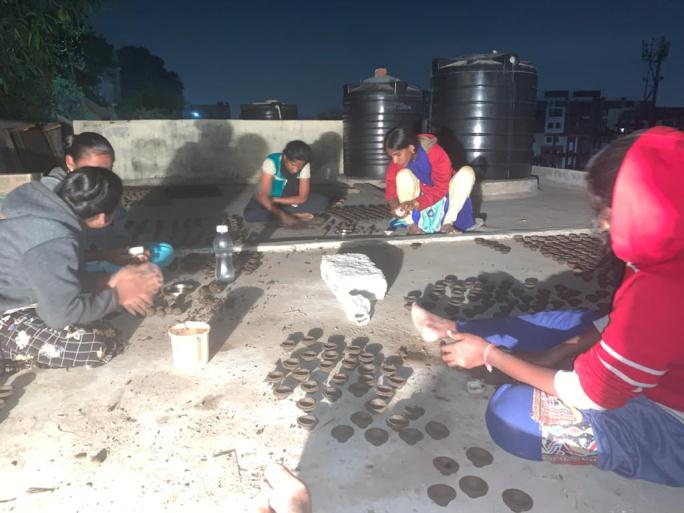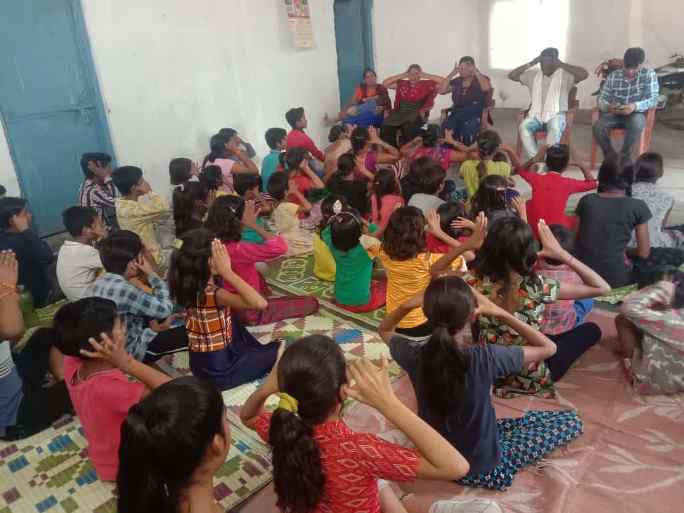Kishoris’ development is the development of society Kishori Vikas Kendra
Telangana

When
a woman’s heart melted to see a mother and daughter in a miserable condition at
the busy Ameerpet junction in Hyderabad, the mother said that an auto-rickshaw
driver had picked up her daughter and left her here a few days later, and those
ears heard the terrible injustice. With that, the eyes were cloudy, and not
knowing what to do, the legs ran to the Seva Bharati office. The hands begged
for help.
After knowing about the service activities by Vadehi Ashram, who is already taking care of the girls without parents in the Telangana region, and supporting the girls living in the slums of the city who have stopped in the middle of their studies, by way of giving them self-confidence, pays their college fees and helps them in their studies, The women consulted the mentors of this ashram, then RSS Prant Sanghachalak Sri T.V Deshmukh ji, Dakshina Madhya Kshetra Seva Pramukh Sri Patlolla Rami Reddy ji, Telangana Pranth Seva Pramukh Sri Ekka Chandrasekhar ji. They deeply grieved by that incident and discussed that, it should not happen to another girl and parents, and thought that these kind of situations can be avoided only by way of complete development of women. The outcome of the meeting is the Kishori Vikas Kendra.

Kishori means young women. Vikas means development, the development of the women means the development of the society. The Kishori Vikas Kendra is a yajna that is intended to start from the basti (slum) first i.e. a programme as a basti center. But to take this programme forward, a continuous efforts are needed, many obstacles had to be overcome, and realizing that the capacity belongs to the mother's heart, they entrusted the responsibility of Kishori Vikas Kendra to Jayaprada Ji, Kiranmayi ji, Sambhuni Kumar ji, Yeruganti Narsimlu, Ambadas ji who was already carrying out the seva programmes through Seva Bharati.
Considering the ups and downs that followed the opening of this Kendra, it is appropriate to say that the Kishori Vikas Kendra is a focal point for complete social transformation rather than a vocational education centre. As part of vocational education training in the bastis and villages, girls and women are trained in stitches, knitting, natural dyes used during the Festival of Holi, making clay Ganesh idols, making clay Diyas (lights), gomaya (cow based) products and hence they are moving towards self-reliance. Teenage girls are taught self-defense such as yoga, karate, karrasamu. But, somewhere there was a small scarcity. After collecting data points and discussing everyone's opinions, a solution was found, which was the seed of starting tuition centres. The objective of the programme is to start a tuition centre in each basti along with vocational education center, so as to provide education and samskara to children, and to raise awareness about the health of the people living in the basti.

The delay was only in the thought but everything was procured in a pinch. Jayaprada ji got a wonderful team in the form of Andal, Rama, Kalpana, Kavita, Mamata, Girija, Meena etc. to take this initiative forward. Child marriages are common in Korravani Tanda and Kavitha's parents also decided to get her married at the age of 10-12. Seva Bharati activists spoke up and made the girl run the Kishori Vikas Kendra and make her continue the studies so now she did her PG and working as a yoga and dance teacher in a school, but is still active in coordinating Kishori kendras. "We have been able to stop around 20 child marriages in that tanda because of this one centre," says Meena. Sarvani, whose father died when she was a child, runs a centre for 30 children, including her elder brother's children, earned an IT job in an MNC company, after completing B.Tech and still working to set up more centres in her basti and surrounding areas. Sarita's father was a watchman and she had an eye-related disability, came to know about Seva Bharati through friends and started a centre in her basti and continued her studies. Now she is doing an IT job. Seva Bharati volunteers Anuradha garu and Seva Bharati Treasurer Harish garu have given the required training in IT and have already caused 8 people to get an IT job. Many girls are taking steps towards development in the bastis in the same way.
In Mahatma Gandhi Nagar near Sheikhpet in Bhagyanagar, many people were addicted to bad habits and indulged in anti-social activities. Some incidents where children's dead bodies were found in the bushes of the trees mirror the conditions there. There was a change in many people after the Kishori Vikas Kendra was started under a tree in that basti. That the children are studying well. While parents have distanced themselves from bad habits, children have started reading even better seeing the change in parents. Seeing this, some young men gave up their bad habits and with some money set up a shed near Hanuman temple under the tree and helped in maintaining the Kishori Centre there. In this way, the change in the basti started and led to the opening of centres in all the adjoining bastis, which currently has more than 80 centres running in the area.

Growing day by day, Kishori Vikas Kendras are central to education, discipline, exercise, awareness of nutritious food habits, cheerfulness, enthusiasm, wisdom, and self-reliance for women, women empowerment, health care, etc. As of now, around 8000 girls in about 300 centres in Telangana region are directly benefiting and many children, adults and women are indirectly benefitting. Every year, the organisers and swayamsevaks come together to provide the funds required for this project on such a large scale through a programme called 'Run for A Girl Child'. It is one of the biggest fitness events held in Hyderabad and is a testimony to the endurance of the activists. These Kishori Kendras are not only responsible for the development of individual and bastis, but also in the service of social responsibility, an example of which is the service activities carried out in the bastis by kishoris during the corona pandemic. During the lockdown, neither the government nor those who are carrying out service activities can go directly to the bastis. At a situation nobody knows what precautions to take to avoid getting infected and what to do if someone gets infected with the pandemic, at that time, at the call of the Rashtriya Swayamsevak Sangh, swayamsevaks joined the basti seva. By coordinating with the kishoris in the bastis, Swayam Sevaks were able to do food, groceries, medicines distribution and look into hospital and isolation centre facility, oxygen supply, etc. on a large scale. Large-scale awareness programmes have been conducted for the rules and methods related to containing the spread of the virus and providing awareness on the vaccine. The service of the kishoris in dealing with such a big pandemic is indescribable.
Writer
Shrinivas Taduri